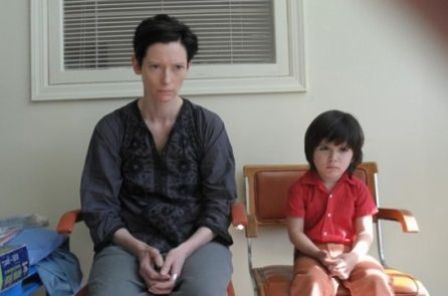 Lynne Ramsay’s bold and accomplished work We Need To Talk About Kevin has much to live up to, stemming as it does from the best-selling book from Lionel Shriver which successfully captured the minds of all who turned its pages. It’s not difficult to understand why either as the subject of the book homes in on one of the most lamentable if fascinating phenomenon’s of recent history; the high school massacre. Shriver’s book, however, was foremost concerned not with the massacre itself but with teasing out the simmering unpleasant undercurrents within the family that gave birth to a killer. Staying true to the book Ramsay’s film has lost none of the focus on the familial relations. And this is quite respectable given the ease with which she could have eschewed these in favour of exploiting the shocking nature of the crime. Rather We Need To Talk About Kevin follows the story at the heart of the novel; the decaying relationship between mother and son.
Lynne Ramsay’s bold and accomplished work We Need To Talk About Kevin has much to live up to, stemming as it does from the best-selling book from Lionel Shriver which successfully captured the minds of all who turned its pages. It’s not difficult to understand why either as the subject of the book homes in on one of the most lamentable if fascinating phenomenon’s of recent history; the high school massacre. Shriver’s book, however, was foremost concerned not with the massacre itself but with teasing out the simmering unpleasant undercurrents within the family that gave birth to a killer. Staying true to the book Ramsay’s film has lost none of the focus on the familial relations. And this is quite respectable given the ease with which she could have eschewed these in favour of exploiting the shocking nature of the crime. Rather We Need To Talk About Kevin follows the story at the heart of the novel; the decaying relationship between mother and son.
Tilda Swinton plays Eva, a woman who through strategically placed hints we come to understand as a free spirit and adventurer. One who is evidently now a coiled spring having landed herself, somewhat accidently, in the role of mother. The eponymous son Kevin is embodied – in quite literally a star making turn – by Ezra Miller, the Satan spawned sociopath. And though Miller’s idiosyncrasies and gestures are so chillingly brilliant it’s a performance facilitated principally by the equally fantastic deadly precocious and calculating role of his younger self, played to eerie perfection by Jasper Newell. Kevin’s manipulative and broken relationship with his mother is juxtaposed, and perhaps exemplified, in his joyous, obedient bond with his father Franklin played by John C. Reilly.
As the film unravels and we begin to understand, and most importantly believe, how a bond born of such personal connection can descend into such a decrepit state there is an omnipresent ominousness which evokes a gut hallowing feeling. The notion that Eva’s own resentment and rejection of the young baby manifests itself in his behaviour towards her and others is of course a key element to the film and one that is projected strongly as Swinton fantastically portrays a women torn between motherly devotion and forced captivation. A women who wallpaper’s a room with maps to escape vicariously is the trigger for a son who will in turn fill a room with something that evokes his own deadly personality. The time spent between Eva and Kevin is an amalgamation of horribly powerful scenes, impossibly cruel moments and images so tragic they’re in fact comical; and this mixture provides a defiantly resonating, disturbing and intimate experience.
Told in a disorientating and distraught fashion the film jumps freely between past and present to slowly unveil the putrid causes of the present malfunction that is Eva’s life. And it’s credit to Ramsay’s tight direction and notion of space and time that despite the rapid energy – that is an embodiment of the grief and confusion of Eva herself urging her to reach and grope for any memory to provide clarity to the present – the audience is both gripped and aware that we are witnessing, however small they may seem, momentous, life-changing moments for both mother and son. This method of jumping backwards and forwards through memories and moments allows Ramsay to use imagery to great effect. The audiences awareness of Kevin’s eventual action creates a constant palpable tension to every movement, look or gesture that will, we know, prove to be one more slight push towards Kevin’s edge of insanity. It also allows Ramsay to play with colour, if slightly overzealously, allowing angry blood reds to pervade almost every scene in the film to the point where we aren’t sure if they’re distortions born of tragedy in the excavations of Eva’s memory or if they were ever really tinged at all.
We Need To Talk About Kevin exists as a slowly burning livewire of repressed rage, explosive anger and quiet dissatisfaction that lead to the inevitably destructive climax. But in the end there is a deadly allure to Kevin’s inveterate solipsism that belays his waywardly sinful nature. Indeed the film is most utterly heart-breaking in the moments where Kevin’s façade slips just enough to expose the cracks in his otherwise fuming contempt of his surroundings. Barely once or twice do we witness the scared, haunted, hungry for affection child that Kevin really is and for those brief snippets into his locked away soul the film is devastating.





